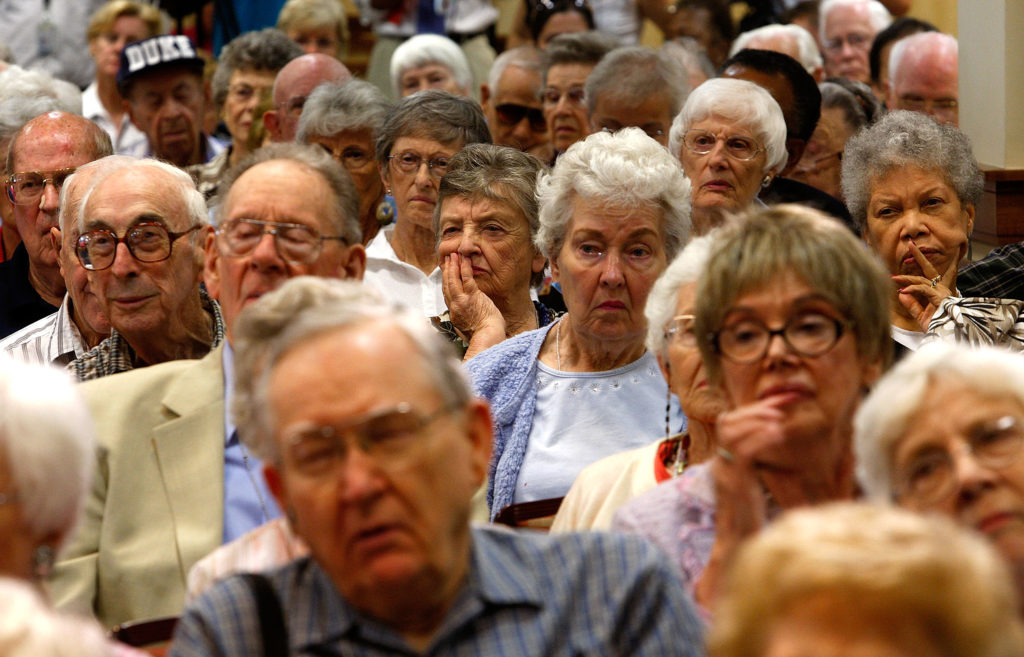Gray Wave Building

We live amidst a graying society. If the constant walk-in-tub ads and exhortations to buy gold haven’t convinced you, then this story will be a shock. The Washington Post has a story about a “catastrophic” age demographic mismatch impending in the state of Maine, and what it portends for the nation at large.
This article makes a great case that as the percentage of the population that is elderly increases, the rising cost of labor is making it tougher to fill jobs for senior care. The seniors needing in-home or nursing home care are in most cases covered, but the jobs just aren’t getting filled.
Maine’s elderly now add up to more than 20% of the total population. Nursing homes are closing in Maine despite demand. “Care workers in Maine were paid about $11.37 an hour in 2017, according to an AARP report, with a 2019 minimum wage of $11 an hour.” One person noted, “Even Dunkin’ Donuts pays you more.” And the work is probably a lot easier with a lot less paperwork. Who could blame them?
And get this: “About one-third of Maine’s physicians are older than 60. In several rural counties in the state, close to half of the registered nurses are 55 or older and expected to retire or cut back their hours within a decade.”
“From 2015 to 2050, the number of Americans 85 and older will increase by more than 200 percent, while those ages 75 to 84 will rise by more than 100 percent, according to AARP.”
And who takes care of them? “The United States is projected to have 7.8 million job openings for care workers by the middle of the next decade … The total cost of caring for America’s elderly will double from $2.8 trillion to $5.6 trillion by 2047, a report by the consulting firm PwC found.”
Ideology aside, the practical point is that this is a big, big problem, and an imminent one. The economic truism is that we get more of what we subsidize, and the elderly have been subsidized for decades. Poorly envisioned, badly run programs and unrealistic expectations have led to nearly incomprehensible budget overruns that limit flexibility to respond to higher demand with higher wages, hence, labor shortages. If physicians were serious about sustainable senior care, they might push for serious, radical reform of these unsustainable programs. Just wringing one’s hands because there are no open nursing home beds nearby will not encourage anyone to staff them, absent more cash.









Or just keep immigration as it was, lots of unskilled but motivated workers willing to live on minimum wage because they live with relatives and work more than one job. Often from countries that value seniors even when debilitated.
These gray hairs are the very people who refused to look ahead for America in the 70’s and 80’s and 90’s when they could plan for such things as the graying of America. The USA really hasn’t taken any interest since the 1960’s in looking to what the country, society and world might be like in 20 years. It’s called “progressivism” and it’s a dirty word.
We have wound up with a US Healthcare system that equals that of Portugal and Turkey in its organization, infrastructure and soundness. The history of extinct societies is rife with those which would not contemplate the crises staring them in the face. We’re on the road to joining them. Any society which lets its clinics become places unfit for doctors, soon will have no doctors – really, doctors in name only.
Great article. The question is, when are we (collectively in medicine and as a society) going to start having the difficult conversations about death in order to destigmatize it? I treat too many patients in the ED who are in their 80’s (at varying stages of health) who have not had a talk about quality of life. I think this goes to the point of about lack of decent primary care – too few of the conversations regarding DNRs and “what the patient defines as quality” are happening because 9 minute visits aren’t enough. I have much more time with my patients in the ED than most PCPs, so we have the end of life discussion in my ER when quick decisions are critical and that is absurd. If the necessary discussions had been had prior to coming to the ED, they might not have come at all (at least for nothing more to know what’s wrong and palliative care, etc). I encourage as many patients as possible to read “Being Mortal” by Atul Gawande, as I think it frames the end of life discussion very well, but I believe much more has to be done within the medical community as a whole. In the end, we spend too much on end of life and I believe it has a lot to do with our culture that out of fear avoids the necessary discussion of death.
Where do you propose “more cash” should come from?